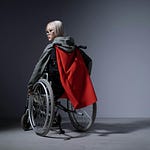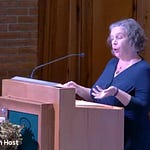I am a hypocrite.
I guess we all are to some extent, but I’m really feeling my own hypocrisy deeply today.
I’m judging people. I’m lumping people together and “other-izing.” I’m letting my fear and anger spill out.
And I’m supposed to be all about love.
A friend reminded me there is such a thing as righteous anger. That Jesus tipped over the tables at the Temple because he judged the moneychangers as exploitive – taking advantage of faith for profit.
And I’m angry now, too – at those who I feel are taking advantage of people’s faith in the name of acquiring power. And even angrier at those who are letting them – who know better but don’t speak out.
I’ve been aware of my own hypocrisy in the name of religion for a long time, but I thought I’d mostly resolved it. Since college, I’ve said I was open to all kinds of faiths and belief systems … except for those who believed theirs was the only true and correct faith.
So I was judging those who were judging.
It turns out there’s a name for this: the Paradox of Tolerance.
Philosopher Karl Popper put it simply: if tolerance has no limits, intolerance will eventually destroy it. If we don’t defend a tolerant society against those who abuse it, tolerance itself will vanish.
In other words, tolerance can only go so far. Allowing people to say and do whatever they want stops when thoughts and words cause harm.
This isn’t just theoretical for me. Years ago, I came up with my own two questions as a kind of compass for spirituality:
Is the belief or practice life-giving to the person who believes or performs it?
Does this belief or practice harm the person or anyone else?
If it’s life-giving and doesn’t harm anyone, then I say let them be. But that tolerance only goes so far. When there is harm, I start questioning whether that belief is life-giving.
I’ve come to see that certainty of belief is usually harmful, both to the person holding that certainty and to those around. It closes the door to curiosity, to humility, and to growth. And it justifies harm in the name of protecting itself. “This is the only correct way to think, believe, and feel; therefore, you must comply … or else.”
Which brings me to the larger choice we all face, whether we’re religious or not: We are always moving in one of two directions: toward fear or toward love. Toward harm or toward growth.
Fear wants certainty. Fear clings to power. Fear labels, draws lines, and builds walls.
Love accepts limits but refuses to dehumanize. Love names harm while still seeing sacred worth.
Every word, every silence, every policy, every act moves us in one of these two directions.
And the paradox of tolerance sits right in the middle of that fork in the road.
Fear or love.
Love doesn’t mean tolerating what harms, but it also doesn’t mean abandoning the truth that every person carries the breath of the Divine. Every person. No exceptions.
I’ve seen how both paths take root.
In 2001, I spent a week in a small town in South Carolina. Running errands, I stopped at a McDonald’s and found myself the only white person there. That didn’t scare me – I’ve lived in diverse places most of my life – but it surprised me. And I received a number of startled looks.
At the grocery store, there was a mix of races. At church, everyone was white.
Later, a neighbor explained: I had gone to the “Black McDonald’s.” The “white McDonald’s” was across town.
It was segregation without signs. Invisible, absorbed as normal. As if unspoken lines kept people apart, with consequences for crossing them.
That’s fear.
By contrast, when I was talking about growing up just outside Washington, D.C., someone recently commented, “Now I understand your passion for diversity. You’re just comfortable with it.”
And they’re right. Diversity was part of the soil in which I grew. There weren’t hard lines with invisible barriers. People often grouped together, but it rarely felt exclusionary to me, as long as I approached it with curiosity and respect. Because I saw diversity as ordinary, I could see it as beautiful.
That’s love.
But here’s where I have to be honest. There are days I don’t want to see the sacred in people who cause harm.
In earlier years, I could find compassion for the wounds that shaped some of our leaders. Now, it’s nearly impossible. The damage is so vast, the arrogance so blinding, that it’s easier to see only the destruction.
When I watch crowds cheering cruelty, I feel the shadow slip through me – my own anger, and the fear that maybe love really can’t win against that.
But here’s what I come back to: choosing love has never meant excusing harm.
It means refusing to become what I oppose.
I can remember that fear shrinks the world, but love expands it. And even when love feels small, and my capacity for love feels broken, love is still the only force that heals.
So yes, I am a hypocrite.
But the Paradox of Tolerance reminds me there is no shame in that.
Love reminds me of the deeper truth: that every human being – even the ones who frighten and anger me most, even the ones who seem to hide it the most – carries the breath of the Divine.
We are either moving in the direction of fear or in the direction of love.
Love may not always feel easy, but it is still the only destination worth walking toward.
Joni Miller, Ph.D., is a writer, researcher, spiritual coach, and speaker who uses her knowledge, education, and love of all things spiritual to help spiritual wanderers find a place they can call home, navigating by the light of Love. www.SpiritualGeography.net
Photo by SHVETS production: https://www.pexels.com/photo/a-woman-in-red-dress-standing-on-green-grass-while-holding-a-mirror-8929561/











